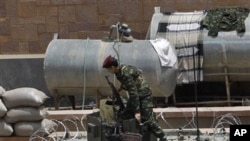Unrest continues in the nation of Yemen. Against a background of recurring demonstrations demanding change, negotiations for the exit of President Ali Abdullah Saleh have stalled. Yemen may perhaps be the most complex case of all the Middle East countries in turmoil.
The old adage known as “Murphy’s law” states that “anything that can go wrong, will go wrong.” Christopher Boucek, a Yemen specialist at the Carnegie Endowment for International Peace, says that maxim seems particularly applicable to Yemen.
"So when we’re talking about the grievances that fuel this, we’re talking about corruption, unemployment that’s official at about 35 percent but is probably closer to 50 percent, cronyism, nepotism, a failing economy, the country’s running out of water, running out of oil - just about everything that could go wrong in Yemen is going wrong," he said.
Yemen, lying on Saudi Arabia’s southern border, is the poorest country on the Arabian Peninsula, a fragmented tribal land beset by a sagging economy, a restless and growing youth population, a rebel movement, and a functioning al-Qaida presence.
In Yemen, as in many of the other Middle Eastern countries beset by calls for change, the political grievances arise out of economic discontent. But while countries like Egypt and Tunisia were governed by autocratic rulers, Yemen has a president, prime minister - appointed by the president - legislature, and a political opposition.
But analysts say the political institutions have not had a chance to take root and mature. Former U.S. ambassador to Yemen Barbara Bodine says that after Yemen’s unification in 1990,it started down a path to democratization. But she says that stalled under the pressures of an economic downturn and an insurgency by Shi'ite Houthi rebels.
"Over time you’ve seen this increasing sense of general frustration that the country has not just stagnated but started to slide backward, and started to slide backward because of, say, misgovernment, and perhaps that the president after 32 years had been in power too long, the government was stale, it needed to be revived, revitalized, as well as reformed," she said.
The opposition, say analysts, is divided between what might be called the “official” opposition in parliament, and the youthful street protestors. Chris Boucek says the opposition is loose and fragmented and has no common goals beyond President Saleh’s departure.
The only thing that the opposition - all of the opposition - is unified on is that President Saleh and his family should go. After that there is no kind of commonality or shared platform or anything. What we’ve seen is that the opposition - any of the opposition - have not advanced any sort of an agenda," he said.
Negotiations on President Saleh’s exit and a transition have stalled. Some senior members of the military have gone over to the opposition.
But, significantly, analysts say, they did not resign their posts or cut themselves from the government. Chris Boucek says officials who have defected are in effect jumping from a leaky political boat to a sound one with an eye toward some role in Yemen’s future setup.
"Honestly, what I think you see going on is these different power elites trying to maximize their position ahead of any negotiated settlement, which I still, despite everything that’s happened I still believe this is what we’ll see - some sort of negotiated settlement where the president will agree to leave, which he’s pretty much already done. But there needs to be a process by which he leaves or there needs to be a process for that transition from President Saleh to whatever it is that comes next," he said.
Analysts say there is no guarantee the young protesters will accept the negotiated settlement. Moreover, it is not clear who will step into the power vacuum as there is no respected entity to assume transitional power, as the military did in Egypt.
But, says former ambassador Bodine, Yemen has some political infrastructure on which it can build.
"Unlike Egypt, Tunisia, Syria, there was a proto-democracy there [in Yemen]. There are political parties. There is a parliament. They just have not lived up to the promise. And so rather than trying to create something out of nothing - which is I think what Egypt and Tunisia are faced with - this is, how do you take what we have and make it real, take it to its own next stage," he said.
But, she adds, whoever follows President Saleh will have to confront huge problems, such as a demographic time bomb of an exploding youthful population, drying up revenues, domestic insurgency, and the continuing presence in Yemen of the terrorist franchise Al-Qaida on the Arabian Peninsula.
Yemen Faces Deepening Economic, Poltical Pressures




